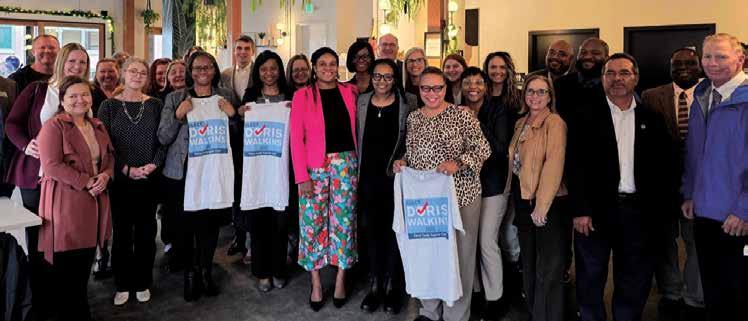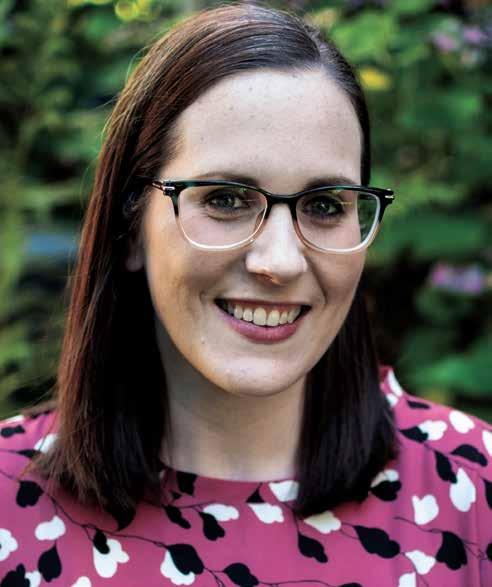

citizen initiative that would increase the risk of violence and abuse of LGBTQ+ students is set to take effect early in Pride Month after being passed by the state legislature. While the initiative has yet to become law and the state courts have the opportunity to intervene, the introduction of such a policy is already impacting LGBTQ+ youth.


SEATTLE & THE PACIFIC NORTHWEST’S LGBTQIA+ NEWS & ENTERTAINMENT SOURCE SINCE 1974 ISSUE 7 FRIDAY APRIL 5, 2024 VOLUME 52 BY HANNAH SAUNDERS SGN CONTRIBUTING WRITER
BY HANNAH SAUNDERS SGN CONTRIBUTING WRITER Content warning: This article contains descriptions of violence against Trans women. Aggression and
against
gender people persists. Earlier this year, Mexico’s LGBTQ+ community took to the streets in protest after three Transgender
were killed in the first two weeks of the new year. BY LINDSEY
SGN STAFF WRITER Doris Walkins has come a long way since the early days of her career working as a women’s domestic violence advocate in college. Though she’s since traded in her small YWCA office for a seat as a Pierce County Superior Court commissioner, she still holds on to her passion for public service. “I’ve represented, throughout my whole career, the most vulnerable litigants in our court system,” Walkins said in an exclusive interview with the SGN SEE HERNANDEZ PAGE 6 SEE WALKINS PAGE 7 RENTON POLICE DEPARTMENT DORIS WALKINS – COURTESY PHOTO STEPHANE MAHE / REUTERS Renton Trans woman found dead in Mexico Black Queer woman aims to be elected to Pierce County Superior Court SEE I-2081 PAGE 6 WASHINGTON
POTENTIAL
LGBTQ+
A
violence
Trans-
people
ANDERSON
STATE PASSES NEW LAW WITH
TO OUT
STUDENTS


CELEBRATING 50 YEARS! APRIL 5, 2024 2 SGN







GAY COMMUNITY CENTER, and gave the address and telephone number of the Community Center. Simple enough? With the economic situation what it is, who could possibly refuse to print an ad for an employment service? The Times and P-I did. On February 13, the Center received a letter from the P-I stating that the “policy committee did not approve the ad for publication.” The next day the advertising manager for the Times called with the same message. The ad was unacceptable. It seems both papers had a problem with the word ‘gay’. You see, gay defines us as human beings, it implies a certain amount of respect. ‘Homosexual’ — a word which both papers are quite willing to print — may define what we do in bed, but we’re a lot more than what we do in bed. We are people, we are not objects of someone’s sexual curiosity. So we decided to fight. The Jobline office quickly got in touch with the Office of Women’s Rights and was told that there might be a possibility of filing a complaint under the


City of Seattle’s Fair Employment Practices Ordinance. Barbara Carter, an investigator from the OWR, called the papers to begin an investigation. Meanwhile, Susan Chadwick, a reporter for the Seattle Sun, expressed some interest in the problems we were having and we talked about them in detail. On February 26, the Sun ran a front page article about the controversy. Ms. Chadwick pointed out that the Community Center had a similar problem with an attempt print an ad containing the word ‘gay’ for our benefit showing of “A Very Natural Thing”. She further mentioned that while investigating the story, her colleagues in journalism at the Times and P-I had given her a pretty rude brush-off.
Shortly after the appearance of the Sun article, the P-I informed us that their ‘policy decision’ was the result of a misunderstanding on the part of an advertising Manager newly hired from Cincinatti [sic]. They agreed to print the ad and assured us that there would be no ban on the word ‘gay’ in the pages of the P-I. Further inquiries at the Times, however, revealed that there had been no ‘misunderstanding’ there. They understood perfectly, and on February 28 they informed us that the policy would remain in effect. What they didn’t understand was our determination to see our legal rights enforced. Under threat of an investigation by the Office of Women’s Rights, and possible prosecution, the Times changed its tune. On March 12, the Times informed us that the ad would be printed as written.
There’s a lesson in all of this, and it’s well summed up by Sam Deaderick in an article in April’s Northwest Gay Review
“The media in this city is learning that gay people refuse to be ignored any longer — it’s a lesson they need to learn well, and that the gay community can’t afford to let them forget.”
To view the article in full, go to https:// issuu.com/sgn.org/docs/sgn_may_1975.
APRIL 5, 2024 VISIT US ONLINE SGN.ORG SGN 3 SEATTLE NEWS REGIONAL NEWS NATIONAL NEWS INTERNATIONAL NEWS ASK IZZY A&E FILM BOOKS ORIGINALLY SEATTLE GAY NEWS 509 10th Ave E Seattle, WA 98102 (206) 324-4297 info@sgn.org sgn.org Publisher Copy Editor Editor Advertising Manager Design / Production Staff Writers Social Media Team Photography Comics Contributing Writers National Advertising Rep. Mike Schultz Angela Cragin (2020 - 2023) George Bakan (1984 - 2020) Jim Tully (1974 - 1984) Richard Isaac Renee Raketty Maggie Bloodstone advertising@sgn.org (206) 751-7454 Mike Pham Lindsey Anderson · Sara Michelle Fetters Daniel Lindsley · Isabel Mata Lindsey Anderson · Cameron Martinez Matt Cyphert · SGN Staff Clar Hart @seattlegaynews @seattlegaynews_ SGN is published by Stratus Group LLC. © 2024. All Rights Reserved. Reprints by permission. Publication of names, photographs, or likeness of any person, organization, event or business in this publication cannot be taken as any indication of the sexual orientation of the person, organization, event or business. Opinions expressed in bylined articles, columns, and letters are those of the authors only and do not necessarily reflect the views of the staff or management of this paper. SGN welcomes unsolicited material, including letters to the editor, but reserves the right to edit or reject material. All rights revert to authors upon publication. We assume no liability for loss or damage of materials, solicited or not. We invite feedback, please write. Alice Bloch · Maggie Bloodstone Kylin Brown · Rhonda Brown · Sharon Cumberland Ian Crowley · Clar Hart · Benny Loy Kali Herbst Minino · Teddy MacQuarrie Cameron Martinez · Shelby Olson · Hannah Saunders Rivendell Media (212) 242-6863 FOUNDED 1974 MEMBER FOLLOW OUR SOCIALS The S______ Times — they are a-changing GAY COMMUNITY CENTER [SEATTLE GAY NEWS] VOLUME 2, ISSUE 3 MAY 1975
4 6 7 13 14 14 15 18 It took a lot of time and effort but Seattle’s gay community has once again demonstrated that standing up for our rights CAN pay off. As a case in point, take the recent dispute between the Gay Community Center and Seattle’s two major daily newspapers, the Seattle Times and the Seattle Post-Intelligencer On February 7th, the
Jobline Program submitted
for advertising to
read: JOBLINE=SURVIVAL,
IN THIS ISSUE
Community Center’s
a request
both papers. The ad
Celebrating 50 years of the Seattle Gay News at the UW’s Allen Library SEATTLE NEWS
BY PIPER DAVIDSON THE DAILY (UNIVERSITY OF WASHINGTON)
Behind the masses of tourists flooding into the Suzzallo reading room lives the Allen Library exhibition space. If, like me, you are able to fight through these crowds, you may find yourself immersed in the history of one of the world’s oldest LGBTQ newspapers.
The Seattle Gay News has been serving the Gay community since March 1974, and has had its archives preserved by UW and Washington State Libraries. These archives have allowed the public to dive into the history of the [newspaper], a history that is now on full display.
The exhibition features cutouts and pages from decades’ worth of papers, largely organized by themes and key events. A highlight of the exhibit was the early-controversies display, which brought to light the paper’s missteps — from sexism to libel lawsuits — in contrast to the largely positive representation in the rest of the exhibit.
While historical and incredibly informative, the exhibit never strays away from
a sense of fun. It gets to the core of what the paper has stood for throughout its five decades of publication. It balances hardhitting journalism with lifestyle columns and feel-good stories.
Another personal favorite was the crossword display, which I tried (and failed) to solve.
The exhibit looks at the paper from two major angles: the history of journalism and the history of Seattle’s queer community. The Seattle Gay News has been the [crossroads] of these two unique histories since its inception, and in turn has found itself a key source for historians.
The archives of the Seattle Gay News can be found at multiple UW libraries, as well as at university libraries across the nation.
The Allen Library exhibit will be on display [through] April 12.
Reprinted with permission
The Suzzallo and Allen Libraries are open Sunday 1-8pm, Monday-Thursday 8am-8pm, and Friday 8am-5pm (closed Saturday).

Local artist Nikita Ares brings rainbows to the rink on Kraken Pride Night jerseys
BY DANIEL LINDSLEY SGN STAFF WRITER
The Seattle Kraken and the Anaheim Ducks crossed sticks at Climate Pledge Arena on Thursday last week, in a match made particularly colorful by a generous splash of rainbow colors. From the DJ booth to the rinkside ads, just about everything at our local hockey team’s Pride Night game was a spectrum of color for the occasion — and they went the extra mile by choosing local Queer artist Nikita Ares to design this year’s Pride jersey.
To the often dreary Pacific Northwest, Ares’s work is like a healthy dose of vitamin D. It’s bold, bright, organic, and abstract. While her jersey’s design is constrained by the Kraken’s “S” logo, it is infused with much of the same energy as her paintings.
In a Zoom call, Ares quoted activist and Harvard professor Cesar Cruz: “Art should comfort the disturbed and disturb the comfortable.”
“I think I’m definitely like the former,” she said. “I think my art is there to comfort the ones [who] are suffering.”
Turning hockey into art
Ares moved from Cagayan de Oro, the Philippines, to Seattle when she was 17. By then, she had spent much of her life surrounded by nature, and painting was just one of many art forms she had practiced. “I grew up in ballet and [playing] the violin,” she said. But she found that visual art, especially painting, “responded” to her in a way other media didn’t.
As an immigrant moving to the United States, Ares said, “there was a lot of fear of being rejected, right? Just because I felt different.”
This was not the case, however, at Cornish College of the Arts, from which she graduated with honors in 2018. Since then, her work has been featured in the Seattle Times, City Arts Magazine, and The Stranger
The idea of art being a two-way street — a relationship more than an imposition of the artist’s will on a medium — is at the core of Ares’s work, Pride jersey included. “Each shape kind of represents an iden-

tity, or some sort of uniqueness,” she said of the design. The “S” could be seen as an ice rink, the shapes inside as players, or even expressions of the energetic movements that punctuate hockey matches.
Ares transformed the anchor symbol on the jersey’s sleeve into a heart with a radial shape
at its peak; she said that love and passion, whether for hockey or for art, were at the top of her mind during the design process.
Before being commissioned by the Kraken, Ares wasn’t a big hockey fan. “But seeing hockey for the first time, [I was] amazed,” she said. “This mad skill, this wild energy that
[the players] put out is really cool.”
Along with other members of Seattle’s Queer community, Ares had the spotlight a few times during Pride night’s intermissions — once while riding a Zamboni (the machine used to smooth out the ice) and again while appearing on the jumbotron for a quick word.
CELEBRATING 50 YEARS! APRIL 5, 2024 4 SGN
SEATTLE KRAKEN
PHOTO BY PIPER DAVIDSON


Visibility is important, but beyond lip service, the Kraken did put some money where its tentacles are by holding an auction of player-signed Pride jerseys to benefit the Seattle Pride Hockey Association. The group’s stated mission is “promoting and advocating for diversity and inclusiveness in the Pacific Northwest ice hockey community.”
The National Hockey League as a whole, however, has maintained its policy banning players from wearing Pride jerseys on the ice, even during warmups. That decree was made in June of last year, after a dozen or so players objected to wearing Pride colors for what they maintained were religious reasons.
That same ban briefly prohibited players from using Pride-themed stick tape as well — the same tape that was sold out by the end of the second period of Thursday’s game. Official restrictions be damned, many
NHL teams still celebrate Pride Night locally to remind their fans that hockey is indeed for everyone. They dress their mascots in Pride jerseys in lieu of their players, they feature local Queer artists, and they raise money for Queer advocacy groups, just as the Kraken did.
Now Ares has played a part in what she hopes is a better relationship between the Queer, sports, and art communities of Seattle. There have always been Queer hockey fans, but last week’s game was a warm invitation for more. (It also probably helped that we beat the Ducks 4-2.)
You can find more of Nikita Ares and her work at http://www.nikitaares.com, or by visiting her Instagram @kita.licious. The Kraken’s last home game this season will be Thursday, April 11, against San Jose.



APRIL 5, 2024 VISIT US ONLINE SGN.ORG SGN 5
Pride in the NHL
RICH ISAAC
NIKITA ARES
REGIONAL NEWS
HERNANDEZ
Now Reyna Hernandez — a Trans Latina and Renton resident — was recently found dead in a cemetery in Mexico, bound by her hands and feet, shot in the head, and wrapped in a blanket.
“Renton police detectives have taken over the investigation into the kidnapping and death of Reyna Hernandez. We had her body transferred to the King County Medical Examiner for an autopsy,” Meeghan Black, Renton Police Department’s public
CONTINUED FROM COVER I-2081
CONTINUED FROM COVER
Initiative 2081 would allow parents and legal guardians to receive public school records — like vocational counseling and medical records — and would allow the opting-out of surveys, assignments, questionnaires, and any other student engagement activities that relate to a child’s sexual experiences and orientation.
“At a time when LGBTQ+ youth — especially Trans youth — are being attacked on a national level, they are more vulnerable than ever,” Kai Aprill-Tomlin, communications and membership development manager at the Gender Justice League (GJL), told the SGN
Risks to youth
Medical and mental health records remain protected by other state and federal laws, like HIPAA and FERPA. After holding extensive conversations with legal experts, the GJL does not believe that I-2081 would automatically allow parents to access the medical records of their children, and noted that a state initiative does not overpower federal law. The initiative will, however, impact the sense of privacy for LGBTQ+ youth. It will create new risks for abuse and violence in their homes.
“If a parent learns their child is talking to a trusted adult at school about violence or abuse in the home, this increases the risk for [it] to ramp up,” Aprill-Tomlin said. Generally speaking, LGBTQ+ youth have smaller circles of trusted adults, and youth require supportive adults in school and home settings for healthy development. A key contributor to building trust between youth and adults is privacy.
The GJL is concerned that I-2081 will create additional conflict between parents and vulnerable LGBTQ+ youth, even with state and federal protections in place. The organization thinks this initiative may lead youth to view parents and adults as untrustworthy, which may prevent them from asking questions or disclosing experiences of violence.
“We are deeply concerned that I-2081 will erode students’ trust in adults and ultimately lead to more harm to youth,” AprillTomlin said. “When a student chooses to disclose to a trusted adult at school that they are questioning their gender or sexuality and this information is then given to the parents against the student’s consent, then we teach youth that consent does not matter, to bottle up their feelings and ideas, and that adults are untrustworthy.”
“As an organization that works with survivors of gender-based violence, sexual assault, and survivors of crime everyday, it is deeply concerning to us that this law may limit the sense of safety youth feel around adults,” Aprill-Tomlin added.
“This is incredibly dangerous. Without trust, youth are unlikely to disclose if they are experiencing violence, harassment, bullying, or mental health issues. This can lead to disastrous outcomes: they suffer in silence, continuing to experience the bullying/violence; they self-harm; they turn to gun violence; or they end their life.”
The organization is encouraging school boards to be mindful of HIPAA and FERPA protections of students as they cre-
information officer, told the SGN Hernandez was an independent small business owner who operated Reyna Hair Salon, located at 3219 Sunset Boulevard NE. The 54-year-old went to run errands on Feb. 26 but never came home. Friends reported Hernandez missing on February 28 after not opening up her business or responding to calls and texts, according to the RPD.
A Mexicali news article alerted Renton detectives to an unidentified body found in a local cemetery off Tijuana Highway on March 8, and during that weekend, investigators identified the body as Hernandez.
A 61-year-old suspect was arrested by
Mexican law enforcement officials on unrelated charges, and Hernandez’s vehicle was recovered. Detectives are considering the case a domestic violence crime.
“They had been in a relationship, and he is still in Mexico,” Black said.
Fox13 TV station in Seattle reported on Hernandez and her previous experiences as a victim of domestic violence: before she went missing, her clients saw her with a black eye.
“This is the worst possible outcome, and our hearts go out to Reyna’s family and friends,” Investigations Commander Chandler Swain said in a statement. “We are
working closely with Mexicali police and our US federal partners to determine when and where Reyna was killed.”
Renton police detectives are also working with the King County Prosecuting Attorney’s Office to build a case against the suspect.
“Typically, in an investigation like this, we build our case, the prosecutor files charges, and then a warrant is issued for the suspect. At that time, we would work with local and federal authorities to extradite the suspect to Washington State to stand trial,” Black said.
Black added that Renton PD will continue to collaborate with Mexican law enforcement officials to facilitate this process.

ate new policies, and to remind teachers and administrators of the federal rights of students. Under HIPAA, parents can access their children’s protected health information when there is imminent danger and when the parent is able to reduce the risk of danger.
“Giving [parents] extra access to view medical and mental health counseling records does not have any positive impact on youth,” Aprill-Tomlin said. “It erodes youth’s privacy, ability to safely express themselves, and ability to exercise bodily autonomy. It increases the risk of self-harm and suicide.”
Licensed medical and mental health professionals must maintain confidentiality under federal law. The Gender Justice League believes schools may maintain the confidentiality of personal information, even when not penned into a student’s written records, such as conversations between students and teachers.
The GJL encourages youth to contact it if they feel like any adult or school has violated their rights to privacy.
The benefits of sex education in schools
Current state law allows parents and legal guardians of youth under the age of 18 to opt out of classroom activities that relate to sex education, and I-2081 affirms that right.
However, “comprehensive sex education has a ton of benefits that we should all want for our youth: reduced risks of unwanted teen pregnancy, HIV and STI transmission, and sexual assault and domestic violence; and an improved ability to identify, prevent, and intervene in child sexual abuse, bullying, and homophobia,” Aprill-Tomlin said.
Youth who receive sex education learn about ways to prevent, stop, and disclose sexual violence, including child sexual abuse. The GJL believes youth have the right to learn about their bodies and make informed decisions about how to have safe sex when they are ready.
“As a community that is greatly impacted by HIV, we have deep concerns about students being denied the opportunity to learn about how HIV is transmitted and the tools
available to keep themselves and others safe,” Aprill-Tomlin said.
Aprill-Tomlin highlighted how youth who forgo comprehensive sex education are more likely to both experience and perpetrate sexual assault and domestic violence, and are less likely to report or intervene in sexual violence and bullying as a bystander.
“Opting LGBTQ+ youth out of [sex] education sets them up for failure,” AprillTomin said. “All youth struggle with developing bodies and budding feelings and relationships, but for LGBTQ+ youth, there are added layers of questioning, confusion, and a sense of isolation, making them extra vulnerable to sexual assault, domestic violence, bullying, and hate crimes.”
Arguments in favor of the legislation
A group of concerned citizens, known as Let’s Go Washington, brought forth this initiative to the legislature after collecting 454,372 signatures from supporters. Lawmakers debated the initiative in this year’s session and had the option to place it on the November ballot. They chose to enact the initiative into law as is.
Hallie Balch, press secretary for Let’s Go Washington, told the SGN that I-2081 is an important step forward for parents and schools.
“It affirms the commitment schools have in both caring for children and in protecting the right of parents to know what their children are being taught in schools,” Balch said. “It reinforces existing law that requires schools to update parents when medical or disciplinary actions are taken on their kids. I-2081 has received a broad range of support from hundreds of thousands of parents across the state, and we look forward to those protections taking effect in June.”
In addition, Queer legislators Jamie Pedersen and Laurie Jinkins co-authored an op-ed in late February for the Seattle Times in which they said that “about 90% of the initiative is already common practice or state law.” A hearing clarified that there would be no change to adolescent access to healthcare treatment, student privacy protections
for healthcare records, and youth access to home and shelter support.
“We believe the initiative does not pose a threat to our LGBTQ+ youth,” they added. “We will work closely with the state Office of the Superintendent of Public Instruction and the State Board of Education to ensure students are protected and the initiative is implemented correctly.
“However, we stand prepared to change the law should it put any member of the LGBTQ+ community at risk or threaten in any way a young person’s right to protected healthcare.”
Andrew Villeneuve, executive director of the NW Progressive Institute, an organization focused on public policy and research, who is in opposition to the initiative, spoke with the SGN on the potential impact.
“Much of the measure just restates existing law, which is why Democratic legislative leadership opted to pass it. But there are a few provisions that are concerning,” Villeneuve said.
Although I-2081 acknowledges that there are instances where school districts can refuse the release of records (like during investigations of child abuse and neglect where the parent is the target of the investigation), one provision of concern requires parents to immediately be notified if their child is removed or taken from the public school campus without parental permission to a stay at a youth shelter or host home. Villeneuve said prior to I-2081, organizations providing services to unsheltered youth were allowed to delay notifying a parent or guardian if there was a compelling reason, such as abuse or neglect, gender-affirming care, or reproductive health services. I-2081 requires notification “if a child is taken or removed from school without permission, including to stay at … a private home that volunteers to temporarily house youth that are seeking gender-related or reproductive healthcare services,” according to Ballotpedia.
I-2081 was passed March 4 by the House (82-15) and Senate (49-0) and is slated to become law on June 6, unless the courts intervene.
CELEBRATING 50 YEARS! APRIL 5, 2024 6 SGN
STEPHANE MAHE / REUTERS
After spending almost a decade working with survivors of domestic abuse, Walkins decided to take the next step in her career: attending the University of Washington Tacoma and taking the bar exam. “Right after I got my bar results, I had a solo practice for 16 years until I became a Pierce County commissioner in June 2022,” she said.
During her tenure as an attorney, Walkins continued to serve the most vulnerable in the community as a public defender. “People… [are] reliant on their public defender to safeguard their legal rights, be prepared, build a legal argument, and make sure of things they know as a person,” Walkins explained. “The person with the law degree and the legal license is there to argue for them.”
As a public defender, Walkins got to know many people on their worst days. She had to learn how to build trust with citizens who felt the law had turned its back on them. She was there to help parents reunite with their children, to settle disagreements between parties dissolving their marriages as a guardian ad litem, to put together child support plans, and even to oversee estate plans.
As a commissioner, Walkins is now using the skills she cultivated as an attorney and learning to step into a new role. Now she presides over juries, oversees criminal cases, and maintains a courtroom where all parties can feel heard and respected.
“My biggest thing is making sure I listen to the parties and show [them] respect,” she said. “Even if they leave my courtroom and I don’t rule in their favor, I want them to still have the feeling that they had a fair shot and that they were listened to. That’s one of my biggest things: that I am prepared, that I have read the materials, and that I am listen-

ing to the arguments. I’m making a careful consideration of the arguments of the parties and giving as fair a ruling as I can.”
Experience, identity, and impartiality
Walkins is aware that there is more riding on this election than just her personal and career success.
“What I want to do is give people encouragement to go after these positions,” she said. “If you know you’re qualified, if you have the résumé, if you have the experience, don’t let your fear of putting yourself out there hold you back.
“A lot of people have a fear of being attacked or think people [won’t] vote for them because they’re Queer or because they’re a Black woman. You just have to put yourself out there, have confidence, and let the voters decide. If they decide not to vote for you, that’s their decision. If they decide to vote for
you, that’s their decision as well, but I think what I want to do is show people that we are viable candidates and… should be putting ourselves out there and running for office.”
While judicial positions are not partisan, Walkins acknowledges that everyone brings a perspective forged through their experiences and identities to the bench.
“Everyone’s individual identities — no matter who you are — you’re going to bring that to whatever you’re doing, but I think what you have to do is measure,” she said.
Walkins’ career in public service and experience as a Black Queer woman have shaped many of her beliefs and judicial philosophies, but she also knows how to leave her opinions at the door and rule with a fair and open mind.
“You can’t project your own experiences with the world onto the cases you’re presiding over,” Walkins explained. “I think you can
use your professional skills and your experience in the world to sort of be able to see those nuances that maybe someone who doesn’t have all of your experiences might not pick up on. I think all of those are good for making sure you can make really informed decisions, but you can’t let your own individual worldview or experiences dictate how you’re going to rule on things. You have to rule based on the evidence before you and the arguments that are made.”
Walkins prides herself on being an active member of the community in Pierce County and looks forward to serving on the Superior Court bench in collaboration with the other justices and, as she said, “being a part of progressing it even further, as a whole, as a bench, and also [serving] the community members of Pierce County.”
Jumping through loopholes: The challenge Americans face to get PrEP
BY LINDSEY ANDERSON SGN STAFF WRITER
In June 2020, a federal law went into effect mandating that insurance provided through the Affordable Care Act must cover the HIV-prevention medication known as PrEP (pre-exposure prophylaxis). The law requires that all preventative services with an “A” or “B” rating from the US Preventive Services Task Force be covered by public insurance programs. This seemed like a win for LGBTQ+ people, who make up a higher percentage of Medicaid recipients than their heterosexual counterparts, according to KFF, an independent source for health policy research. However, four years later, loopholes in coverage are causing some to still shovel out thousands a month to cover their PrEP.
Chris Pitts, like many Washingtonians, is currently covered by Kaiser Permanente. After his doctor prescribed him PrEP, Pitts discovered that the medication caused a horrible reaction when combined with his anxiety, depression, and ADHD meds. “When I take Truvada or Descovy, I tend to throw those up immediately, pretty violently. I can’t keep it down one way or another,” Pitts told the SGN. Together with his doctors, Pitts started taking PrEP injections once every two months. The new method caused no side effects — but it is not covered by his insurance program.
“I work in food service right now. I don’t make a lot of money,” Pitts said. “The copay at billing can be around $2,000. So, every other month I just don’t get a paycheck.”
Since starting injectable PrEP, Pitts looked around to see if the medication might be covered by other insurance plans. What he found was disheartening. Currently, none in Washington State cover the entire cost of injectable PrEP.

There are cost-effective programs that can help LGBTQ+ get the medications they need, but whenever he seeks their services, Pitts feels as though he’s taking advantage of a program that could benefit others.
“I have been looking into [copay assistance programs], but I’m a little bit frustrated at the same time, because those are resources that other people could benefit from, especially when the Affordable Care Act says, very specifically, that PrEP is supposed to be covered at 100%,” Pitts said.
PrEP and insurance
In the United States, insurance companies are run like private businesses, which means profit is considered before decisions are made. Min Hwan Ahn, an insurance law attorney at Anh and Sinowitz, explained the reasoning behind many companies’ resistance to covering injectable PrEP.
“Insurance companies are risk-oriented businesses,” she told the SGN. “They calculate their operational models based on statistical data, risk assessment, and financial stakes. Typically, injectable pre-exposure
prophylaxis used for preventing HIV/AIDS might not be covered under some insurance policies, primarily due to reasons related to its newness in the market and the lack of longitudinal data establishing its long-term effectiveness and safety.”
According to KFF, Apretude, the only approved injectable PrEP medication currently on the market, should be covered by all insurance plans by 2025. Until then, patients like Pitts will continue to have to pay nearly
APRIL 5, 2024 VISIT US ONLINE SGN.ORG SGN 7
NATIONAL NEWS WALKINS WITH SUPPORTERS AT HER CAMPAIGN KICK OFF EVENT AT THE LIVING TAPROOM IN TACOMA – COURTESY PHOTO
ARTEM PODREZ / PEXELS WALKINS CONTINUED FROM COVER SEE PREP PAGE 13
National news highlights
BY SGN STAFF
Survey finds LGBTQ+ adults face discrimination, including in healthcare
The Kaiser Family Foundation’s 2023 Racism, Discrimination, and Health Survey highlighted the ongoing challenges for LGBTQ+ adults, revealing that 65% faced discrimination, compared to 40% of non-LGBTQ+ people. In healthcare, LGBTQ+ people were twice as likely to experience mistreatment, including unfair treatment and disrespect, with racial bias compounding these issues for Black and Hispanic LGBTQ+ people.
Despite some positive interactions with providers, concerns about appearance and lower comfort levels persist, impacting mental health. Many LGBTQ+ respondents lacked strong local support networks, though they found satisfaction in meaningful connections.
These findings emphasize the continued need for improved inclusivity and support, especially in healthcare, to address discrimination and promote equitable treatment for LGBTQ+ people.
Tennessee:
Police must compensate HIV+ man and update policies after denial of job
The Metropolitan Nashville Police Department (MNPD) is making significant changes and paying financial compensation after denying a job to an HIVpositive Black man in 2020. The man sued the department, highlighting outdated hiring policies derived from US military criteria, which previously banned HIVpositive people.
However, public sentiment has shifted. Moreover, recent court decisions and an amendment to Davidson County’s charter have recognized that HIV should not disqualify people from employment, mirroring advances in medical understanding.
As part of the settlement, Nashville will compensate the man, known as John Doe, and revise its Civil Service Medical Examiner’s policies to explicitly state that HIV is not a barrier to employment as a police officer or first responder.
John Doe expressed satisfaction, stating that living with HIV should not hinder one’s ability to serve the community. Lambda Legal, a key player in challenging HIV discrimination, welcomed the settlement as a step toward removing stigma and aligning laws with modern science.
Louisiana:
RFK Human Rights Award goes to Trans Latina activist
Arely Westley, an LGBTQ+ and immigrant rights activist, has been awarded the prestigious Robert F. Kennedy Human Rights Award for her remarkable advocacy work in New Orleans. She has dedicated herself to supporting LGBTQ+ youth, challenging abuses in ICE detention centers, and improving immigrant support services.
Originally from Honduras, Westley moved to Louisiana as a young person and faced legal challenges related to her immigration status and identity. These experiences fueled her determination to fight against the criminalization of LGBTQ+ minors.
Today, she serves as the campaign director at BreakOUT!, an organization focused on empowering Black and Latinx Transgender and gender-nonconforming youth through leadership programs.
According to The Advocate, Westley expressed gratitude for the recognition, especially as a Trans woman of color and an undocumented Latina woman, acknowledging the unique challenges she has faced in the United States.

White House pushes back against right-wing attacks over Trans Day of Visibility proclamation
Republican politicians and right-wing media figures have made baseless claims that President Joe Biden aimed to replace Easter with Transgender Day of Visibility (TDOV) this year. TDOV, observed annually on March 31, coincided with Easter Sunday, leading to misleading accusations against the Biden administration from conservatives. A White House spokesperson dismissed these attacks as unsurprising from certain politicians.
Easter’s date changes each year based on astronomical events, while TDOV is fixed. Biden proclaimed TDOV in previous years, but outrage escalated before this Easter Sunday. Republican leaders such as Mike Johnson, Kevin Stitt, and Tate Reeves criticized Biden’s acknowledgment of TDOV, claiming it undermined Easter. Former President Trump’s spokesperson and others condemned the proclamation, viewing it as an insult to Christians.
Human Rights Campaign President Kelley Robinson dismissed the outrage, clarifying that TDOV is celebrated annually on March 31.
Wisconsin:
Lawsuit alleges Milwaukee principal bullied, harassed child of Gay parents
According to CBS 58 in Milwaukee, a federal lawsuit accuses Kasongo Kalumbula, a current Milwaukee Public Schools principal, of bullying and harassing a first-grade student with Gay parents while he was an assistant principal at another school. The suit also names the Milwaukee School Board of Directors.
Allegations include physical and verbal abuse, singling out for discipline, and using homophobic slurs. Kalumbula reportedly threatened the child, locked him in a dark room, and made derogatory comments about his parents.
Civil rights attorney Elisabeth Lambert filed the lawsuit, citing at least three other LGBTQ+ families leaving the school due to Kalumbula’s behavior. Despite complaints to the district, supportive services were not offered. The child’s parents eventually withdrew him from the school due to continued hostility.
Kalumbula, now principal at MPS’s Bethune Academy, has not responded to the allegations. MPS issued a standard response, stating that it takes student matters seriously and addresses them according to policy.
Idaho:
Boise State professor behind anti-LGBTQ+, conservative website
A recent report reveals that Scott Yenor, a professor at Boise State University in Idaho, was behind the short-lived but impactful website Action Idaho, which promoted anti-LGBTQ+ sentiments and far-right ideologies. Yenor’s involvement in the site has sparked concerns about potential conflicts between his role as a public university professor and his political activism. Despite not publicly acknowledging his connection to the site, documents obtained by The Guardian detail Yenor’s significant role in its operations. Emails show Yenor seeking funding for the platform, describing it as an outlet to promote conservative values and challenge the state’s establishment.
Action Idaho, active from early 2022 for nearly two years, targeted the LGBTQ+ community: “Action Idaho reserved a particular antipathy for Idaho’s LGBTQ+ community,” wrote The Guardian. One article was headlined “LGBTQ+ Pride Fest Is a Groomer Fest.”
Progressive activists expressed concerns about mainstreaming extremism in Idaho politics and the implications of an educator promoting such ideologies.
Florida: Settlement reached between Disney and Tourism Oversight District
The Associated Press reports that allies of Florida Gov. Ron DeSantis and Walt Disney World have reached a settlement agreement in a state court dispute regarding the future development of the theme park resort. The agreement comes after almost two years of litigation sparked by DeSantis’ takeover of the Central Florida Tourism Oversight District from Disney supporters, following the company’s opposition to Florida’s “Don’t Say Gay” law.
The settlement, approved by DeSantisappointed board members of the district, marks a resolution to the contentious issue. Under the agreement, covenants and a development agreement made with Disney supporters before the state takeover will be dropped, and the new board will operate under an earlier plan.
Walt Disney World Resort President Jeff Vahle expressed satisfaction with the settlement, highlighting its potential for continued investment and job creation in the state. Gov. DeSantis also commented, stating that the actions he took have been vindicated.
CELEBRATING 50 YEARS! APRIL 5, 2024 8 SGN
NATIONAL NEWS
JAMES POLLARD / AP




APRIL 5, 2024 VISIT US ONLINE SGN.ORG SGN 9 Join our bi-weekly E-Digest list! IT'S THE SGN DELIVERED TO YOUR INBOX http://eepurl.com/ioN5V2

CELEBRATING 50 YEARS! APRIL 5, 2024 10 SGN

APRIL 5, 2024 VISIT US ONLINE SGN.ORG SGN 11



CELEBRATING 50 YEARS! APRIL 5, 2024 12 SGN
PREP
CONTINUED FROM PAGE 7
$12,000 a year out of pocket. “Choosing between my mental health and whether or not I’m able to have a sex life is not a choice anyone should be having to make,” Pitts said.
While many hope to see insurance coverage for PrEP expanded in the coming years, a case against insurance coverage of the medication has picked up steam in Texas. In 2022, a Christian business owner in Texas raised the argument that the Affordable Care Act’s requirement of private insurance companies to distribute HIV-preventative medication was unconstitutional and violated his religious rights.
The case found its way to US District
NATIONAL/INTERNATIONAL NEWS
Court, where Judge Reed O’Connor ruled in favor of the business owner, striking down the section of the Affordable Care Act that required no-cost coverage for such services.
The federal government appealed the decision, leading to an administrative stay on the ruling. Oral arguments in the case were heard at the beginning of March, but the Fifth Circuit has yet to issue a ruling. Legal experts predict the conservative bench will likely lean toward stare decisis (adhering to precedent) and uphold O’Connor’s verdict.
The case could eventually make its way to the Supreme Court, where another conservative majority would hold the future of PrEP availability in their hands.
Lifesaving medication
While PrEP is not covered by insurance
in full and may encounter more limitations in the future, global studies have shown that access to medication is lifesaving. In 2021, international health authorities estimated that the annual new HIV infection rate decreased by over 70% in the Netherlands and by 44% in Australia, where HIV preventatives are affordable and easy to access. In the United States, the CDC estimated that the US decline over the same period was only 12%.
“Healthcare policy in the United States is multitiered, and it often clashes with consumer interests,” Minh said. “The Affordable Care Act has expanded coverage to millions, but, like all laws, it possesses some loopholes too. Those ‘gaps’ can contribute to the current situation surrounding the insurance of injectable PrEP. Profit
International news highlights
BY SGN STAFF
Canada:
400+ artists issue open letter condemning anti-LGBTQ+ legislation
Over 400 artists have united against the rising tide of anti-LGBTQ+ legislation in Canada, signing an open letter organized by the Tegan and Sara Foundation. The letter condemns recent measures targeting the Trans community’s access to inclusive spaces, healthcare, and freedoms. Notable signatories include Alanis Morissette, Neil Young, and Elliot Page, among others.
The letter highlights some alarming policies, such as proposed bans on Trans-affirming healthcare in Alberta and parental consent requirements for genderdiverse children’s names and pronouns in New Brunswick and Saskatchewan.
It also emphasizes the importance of evidence-based gender-affirming care and criticizes far-right groups for exploiting fear and discrimination. The signatories stress that such policies not only discriminate but also jeopardize the mental and physical well-being of Trans people.
The letter concludes with a call for inclusive healthcare and rejecting divisive agendas to marginalize vulnerable communities.
UK prime minister uses anti-Trans dog whistle of “biology” to defend JK Rowling
Prime Minister Rishi Sunak of the United Kingdom recently voiced his support for JK Rowling amid ongoing debates about Scotland’s new hate crime legislation. Rowling has faced criticism for her remarks about the Transgender community in the past and her stance on the hate crime law.
In a statement to The Telegraph, Sunak defended Rowling, emphasizing the importance of free speech and stating that people should not face criminal penalties for “stating simple facts on biology.”
The Hate Crime and Public Order (Scotland) Act 2021, which became effective recently, aims to consolidate existing hate crime laws in Scotland. However, it has received criticism for not including sex as a protected characteristic. Despite this, the Scottish government has pledged to introduce a separate law to address misogynistic abuse.
Scotland’s first minister, Humza Yousaf, has underscored the need to combat widespread hatred in society and ensure a zero-tolerance approach toward it. He expressed confidence in the police’s ability to investigate hate crimes while protecting freedom of expression, which is crucial to democracy.
margins and bottom lines can greatly influence coverage decisions of insurance companies even when they compromise patient healthcare and affordability of lifesaving medicines.”
The future may be uncertain, but one thing isn’t — PrEP is a vital medication, and it saves LGBTQ+ lives. “This is an illness. It’s a disease that has the power of eradicating Trans people and Gay people,” Pitts said. “Maybe that’s what they want, I don’t know. It’s a very personal thing for me. The motivation might be that they want this community to just disappear. We have to decide. We are at this moral turning point in our country where we’re very much at risk of steps being taken to eradicate our communities. It’s terrifying.”

Russian bar owner arrested for conspiring with the “international LGBT movement”
In Russia, the owner of a bar called Pose in Orenburg was arrested under the country’s “LGBTQ+ extremism” law, following the detention of two of the venue’s staff members earlier, according to the human rights group OVD-Info. The arrests come after Russia’s Supreme Court banned the “international LGBT movement” late last year.
The unnamed owner was apprehended at a Moscow airport and is accused of collaborating with supporters of the banned movement, potentially facing a decade in prison if convicted.
Previously, Alexander Klimov, the club’s art director, and manager Diana Kamilyanova were arrested after a police raid, which was recorded and circulated online.
Russia’s labeling of the “international public LGBT movement” as extremist has raised concerns, as the vague language of the law puts LGBTQ+ people at risk of severe legal consequences merely for their sexual orientation or gender identity.
Yemen court issues harsh sentences, including death, on “dubious” charges of sodomy
According to Human Rights Watch, a Yemeni court has recently conducted a mass trial resulting in harsh sentences, including death penalties such as crucifixion and stoning, for the defendants, who were accused of sodomy. The trial, which occurred on January 23, 2024, saw 32 men convicted, with nine of them facing death
sentences and 23 receiving prison terms of up to 10 years. Additionally, three men were sentenced to public flogging.
“In an abhorrent disregard for the rule of law, the Houthis are handing down death sentences and subjecting men to public mistreatment without a semblance of due process,” said Niku Jafarnia, Yemen and Bahrain researcher at Human Rights Watch. “The Houthis are using these cruel measures to distract from their failure to govern and provide people in their territories with basic needs.”
The trial has raised concerns about due process violations, including the lack of arrest warrants, unlawful searches, and questions regarding legal representation for the accused. This recent incident adds to previous reports of death sentences issued for crimes related to homosexuality, indicating a concerning trend of human rights abuses in areas under the Houthi movement’s control.
Thailand’s lower house moves toward marriage equality
Thailand is making strides toward marriage equality, as its lower house passed a bill granting legal recognition to samesex couples seeking to wed. This move positions Thailand as a potential pioneer among Southeast Asian nations in embracing marriage equality.
The bill has received overwhelming support from 400 out of 415 lawmakers. However, it still awaits approval by the Senate and requires royal endorsement from King Maha Vajiralongkorn to become law.
If enacted, the legislation will redefine
marriage as a union between two people, irrespective of gender, granting LGBTQ+ couples various rights such as adoption, marital tax benefits, property rights, and decision-making authority in medical matters during incapacitation.
If the bill successfully becomes law, Thailand will follow in the footsteps of Taiwan in recognizing marriage equality, the only nation in Asia to do so.
US embassies cannot display Pride flags outside under Republican-backed law
The recent US government funding package, signed into law by President Joe Biden, has stirred controversy with its provision banning the display of Pride flags on US embassies’ buildings. This move, part of a $1.2 trillion funding package to avoid a government shutdown until September, reflects Republican-backed efforts.
Republican House Speaker Mike Johnson, known for his anti-LGBTQ+ stance, highlighted this ban as a Republican victory. The law prohibits flying flags other than the American flag or specific government-related ones on State Department facilities. However, flags supporting prisoners of war, missing soldiers, hostages, and wrongfully imprisoned US citizens are exceptions.
The Biden administration intends to repeal this ban, citing the provision as inappropriate targeting of LGBTQ+ Americans. The White House clarified that LGBTQ+ people can still serve openly in embassies and celebrate Pride inside them, despite this restriction.
APRIL 5, 2024 VISIT US ONLINE SGN.ORG SGN 13
ANTON VAGANOV / REUTERS
Nourishing the white space
Cultivating mindfulness in a world of distractions
A few months ago, I found myself caught in a perpetual cycle of distraction, skimming the surface of my existence without truly diving deep into the richness of the present moment. It wasn’t until I stumbled upon the insights of neuroscientist Dr. Amishi Jha that I began to realize just how much of life I was missing out on due to scattered attention and constant multitasking.
In her book Peak Mind, Dr. Jha shares that we miss more than 50% of our lives because of distractions. Putting my ADHD aside, this statistic was both shocking and eye-opening, prompting me to reevaluate how I engaged with the world around me. After reading her book, I became keenly aware of the need to cultivate what Dr. Jha calls the “white space” of the mind — that elusive realm where true presence and creativity reside.
The realization dawned on me: in my relentless pursuit of productivity and efficiency, I had neglected the very essence of what it means to live fully: to be present in each moment, to savor the beauty of life’s simple pleasures, and to connect deeply with myself and others.
Inspired by Dr. Jha’s insights, I embarked on a journey of mindfulness, determined to reclaim my attention from the clutches of distraction. I began incorporating mindful-

ness practices into my daily routine, carving out moments of stillness amid the chaos of everyday life. Whether through meditation, deep breathing, or mindful walking, I made a conscious effort to anchor myself in the present moment, tuning in to the sensations of my breath, the rhythm of my footsteps, and the gentle whispers of my innermost thoughts. One of the most profound shifts occurred in how I chose to unwind after a long day. Instead of mindlessly scrolling through social media in a futile attempt to decompress, I turned to activities that nourished my soul and sparked my creativity. Painting,
BY ISABEL MATA SGN STAFF WRITER
Ask Izzy is an advice column about relationships, mental health, and sexuality.
Written by
Isabel
Mata — a Seattle-based lifestyle writer,

drawing, solving simple math problems — these seemingly simple pursuits became my sanctuary, offering a respite from the incessant noise of the digital world and allowing me to tap into the white space of my mind.
In embracing these childlike forms of expression, I rediscovered the joy of uninhibited creativity: the sheer delight of putting a brush to canvas, of allowing my imagination to run wild, free from judgment or expectation. Each stroke of color, each line drawn with purpose became a testament to the beauty of being fully present in the act of creation.
Through mindfulness, I learned to cultivate a deeper sense of awareness and compassion — toward not only myself but also others. I found myself more attuned to the subtle nuances of human emotion, more empathetic
ARTS & ENTERTAINMENT
in my interactions, and more resilient in the face of life’s inevitable challenges.
As many of us navigate the uncertainties of life, the demands of work, and the excitement of summer’s imminent arrival, I am reminded, time and again, of the importance of nurturing the white space of my mind. It is in these moments of stillness and introspection that we can find solace and strength, allowing us to tap into the creativity and resilience that lie within us.
In the white space of the mind, we can discover not only clarity and inspiration but also the profound beauty of simply being alive — of embracing each moment with an open heart and a curious mind. And in that space, we find the true essence of what it means to live fully, authentically, and unapologetically.
Reflecting on an illustrious career: Allen Fitzpatrick closes 27th show at 5th Avenue Theatre
BY KALI HERBST MININO SGN CONTRIBUTING WRITER
The whodunit comedy Something’s Afoot, Allen Fitzpatrick’s 27th show with the 5th Avenue Theatre, closed March 24, but his career certainly hasn’t. In fact, those runs are only one of its interesting aspects.
Before living in Seattle, Fitzpatrick spent seven years in New York, followed by seven to eight in Philadelphia. He originally intended to stay in Philadelphia, having joined the Screen Actors Guild and found his niche as a character actor, but he auditioned for an unpaid showcase that led to him getting an agent — and a spot in a Broadway show.
“Once you get your first Broadway show, it creates some kind of momentum, and you’re able to get other Broadway shows,” Fitzpatrick said.
From 1991 to the early 2000s, his career consisted of productions on and off Broadway. After being cast in seven on Broadway, in 2005, he was invited to Seattle by David Armstrong to play Sweeney Todd at the 5th.
“I didn’t know what Seattle was, as a city with its own particular personality, and I’d never heard of the 5th Avenue Theatre either, but I said, ‘Sure,’” Fitzpatrick recalled. He added that the production was a red-letter experience in his career, and it earned him a Seattle Times “Footlight Award” for Stellar Performance.
“I think it’s a fantastic piece of material. It was a really great fit for me as a vocalist and as an actor. We did a tremendous production — kind of legendary. It was such a wonderful experience. I found Seattle particularly to be a great place,” Fitzpatrick said.

“As challenging as it was to learn an hour or an hour and twenty minutes’ worth of nonstop material, I really embrace the challenge. It was really thrilling to know that every choice that was going to be made was coming from me,” Fitzpatrick said. “That’s extremely liberating.”
Right now, he’s putting out feelers with as many venues as possible about hosting the show again. He’s also planning to market his solo adaptation of Great Expectations
Outside of his acting, Fitzpatrick is looking forward to somewhat of a break. He says most actors try to work six months out of the year, so they’ll be eligible for six months of unemployment benefits. The pandemic changed that dramatically, and he says this is the first time in three years he’ll be able to collect those benefits.
“It’s a great luxury to go, ‘I don’t have to worry about if there’s another show coming down the pike,’” Fitzpatrick said. “Once the money thing is all settled, I’ll still want to work a couple of times a year.”
He’s also almost able to collect Social Security and pensions that come along with being in actors’ unions, which will provide him with more flexibility.
He’s since worked in Seattle for the past decade, teaching acting on top of playing characters and directing for Key City Public Theatre in Port Townsend.
Solo show
“It was a great experience to return to the 5th Avenue, which had always felt more like a theater home than any place I’ve ever worked before,” Fitzpatrick said of Something’s Afoot. “There was a family of actors whom they liked to hire. They were very, very good at it, in terms of being faithful to that.”
As Fitzpatrick recovers from Something’s Afoot, he’s been working on marketing solo shows, as the artistic director at Key City had encouraged him to run one. He initially found the task frightening, but he debuted his solo Christmas Carol at Aspire Repertory Theatre in 2021, then brought it to Key City.
“I think most actors are generally not in the position to say no to an offer, unless they’re in the very envious position of having two offers at once,” Fitzpatrick said. “When the income is not dependent on getting an offer, then you do have that freedom to say no, which is very empowering.”
While he waits to hear some good news about his solo shows, Fitzpatrick’s 48-year acting career is still appreciated by Seattle theatergoers.
Reflecting on it, he said, “You get to be so many different people in one lifetime. That was what was appealing to me.”
CELEBRATING 50 YEARS! APRIL 5, 2024 14 SGN
SOMETHING’S AFOOT – PHOTO BY MARK KITAOKA
Ask
so
healthier
Submit
question today
podcast host, and mental health advocate —
Izzy offers tangible expert advice
all readers can have stronger relationships, better sex, and
mindsets.
your
by visiting https://www.surveymonkey.com/r/ KLKJ6TW
ANGELA ROMA /PEXELS
OP-ED
Refreshingly euphoric The People’s Joker a fair use satirical slap to the face
BY SARA MICHELLE FETTERS SGN STAFF WRITER
THE PEOPLE’S JOKER
Theaters (April 17 in Seattle)
The People’s Joker is an absurdist, autobiographical, mixed-media, DC Comics satire that pushes the definition of “fair use” to its breaking point. Utilizing a crazy, frequently genius, and sometimes exhausting mixture of filmmaking techniques — including live action, green screen, stopmotion, and hand-drawn and digital animation — writer-director Vera Drew has created a uniquely chaotic visual symphony. I’ve never seen anything quite like it.
For Trans viewers, I cannot say this is the easiest watch in the world. This fractured fairy tale of birth and rebirth, gender epiphany, and sexual revolution hits close to
home. Granted, that’s by design. As much as Drew’s feature-length debut is a brazen evisceration of the comic book cinematic status quo and a giddy middle finger to corporate, cookie-cutter comedic staples (most notably Saturday Night Live and, more specifically, its longtime impresario Lorne Michaels), it is more pointedly a journey through self-acceptance, including all the messily depressive speed bumps encountered by most who drive down this path.
But Drew’s absurdist frolic through major Hollywood studio intellectual property is thankfully deeply and (even better) cathartically hilarious. No matter how dark some of the picture’s twists and turns prove to be, the director refuses to drown things in melodramatic treacle or emotionally smothering ennui. Her satirical attention to every detail

Goofy and imaginative Godzilla x Kong
a mixed bag of Monsterverse mayhem
BY SARA MICHELLE FETTERS SGN STAFF WRITER
GODZILLA X KONG: THE NEW EMPIRE Theaters
There are sequences in the latest Monsterverse adventure Godzilla x Kong: The New Empire during which I felt like returning director Adam Wingard (Godzilla vs. Kong) was let loose to do whatever the heck he and his cadre of writers (including frequent collaborator Simon Barrett) wanted, free of any studio shackles. There are long stretches in this installment when heroic ape Kong wanders around the wilds of Hollow Earth fending off a variety of creatures (or trapping for a midafternoon snack) while also searching for other giant apes similar to himself.
These bits are sublime. Kong uses his intellect to set inventive traps to sucker predators into becoming his prey, nurses a nasty toothache, and still makes time to check in on his favorite human, the last surviving member of Skull Island’s Iwi community, Jia (Kaylee Hottle). Later on, when he goes to investigate the subterranean regions of Hollow Earth, the Titan finally runs across an entire civilization of emaciated and angry apes who have been trapped near the Earth’s molten core for unimaginable eons.
This all builds to an extended sequence in which Kong befriends a young primate by showing him kindness instead of cruelty. It also leads him into the middle of a conflict he cannot hope to end on his own and that also unwittingly puts the fate of the planet in serious jeopardy. Kong faces off against the vindictive and conniving Skar King, an elder simian who has subjugated Hollow Earth’s surviving apes to his will and who wants to destroy humanity.
All of these moments are aces. While the overabundance of CGI during these sequences is undeniably noticeable, Wingard still manages to make things feel real even if, as a viewer, I always knew everything up on the screen was made on a computer and not on a sound stage. The visual flow is kinetically impressive, while the sound design is equally excellent. These scenes are also strikingly edited by Monsterverse veteran Josh Schaeffer, and there is a wonderful clarity to the set pieces that in lesser hands could have easily become nothing more than 20-minute bursts of colorfully nonsensical chaos.

Granted, as great as all of this may be, there’s no way the producers would let Wingard make a two-hour faux nature documentary chronicling massive Titans in their natural habitats both above and below the surface of the earth. A human element must be introduced, at the very least to explain what the heck is going on and why anyone watching should care. While this facet of a Godzilla-centered motion picture has typically been anything more than serviceably silly over the past 70 years (you can count all of the exceptions on one hand), for fans — and I am a big one — it’s equally not that much of a problem either.
There are exceptions, of course, and no matter which era of Godzilla you want to look at (Showa, Heisei, Millennium), you’re going to find a few notable misfires. So far, as goofy as they’ve gotten, the Monsterverse has managed to avoid this trap, but dang does The New Empire test that theory. Every new plot element comes with a gigantic helping of expository word vomit, and this becomes increasingly annoying as the plot steamrolls toward its forgone pugilistic conclusion.
Brian Tyree Henry, returning as Titan conspiracy theory podcaster Bernie Hayes, is called upon to deliver the majority of it. While his comic timing and dramatic commitment to the material is unsurprisingly laudable (he did just receive a welldeserved Academy Award nomination
for his superlative performance in 2022’s Causeway, after all), it still feels like the only reason his character is around is to explain what the heck is going on, and that’s unfortunate.
It also does not help that Rebecca Hall, back as Monarch’s Kong expert and Jia’s adoptive mother Ilene Andrews, has practically nothing to do other than to look wide-eyed at all the mystifying peculiarities Hollow Earth has to offer or somberly sulk at the possibility she may lose her beloved daughter to this strange new world.
The actor makes the most of what she has to work with, but as monumentally talented as Hall is, the lemonade she squeezes from these particular lemons still leaves a bitter aftertaste.
The one human character who does make a continually positive impression is Trapper, a “dentist” for Titans, whose loopy enthusiasm for his work (even in the face of almost certain death) is gloriously infectious. Portrayed with euphoric self-confidence by Dan Stevens, this is one of the best performances in the entire Monsterverse. Trapper is a continuous jolt of anarchic energy, and if Wingard ever decided to make an entire film following this guy around in his day-to-day kaiju veterinary responsibilities, I’d be first in line to watch it.
Events climax with the requisite giantcreature slugfest, this time in Rio de Janeiro. While the Skar King shouldn’t be
much of a match for the combined might of Godzilla and Kong, there’s a secret reason the cantankerous alpha Titans must once again join forces to bring down a common enemy, and I’m not about to spoil what that is. I’m also not going to go into why Jia is an integral player in the carnage, but anyone familiar with Showa- or Heisei-era Godzilla films will be able to quickly figure out why a potentially telepathic young girl with the ability to communicate with monsters may be important.
Much like with Godzilla vs. Kong, Wingard shows he’s up to the challenge of staging these battles. The crashes are substantive, the booms make an impression, and the whizbang amazes. But I do miss the sense of overwhelming awe that was present in all three of the first Monsterverse entries (Godzilla , Kong: Skull Island , Godzilla: King of the Monsters), and at a certain point, watching buildings get smashed by these all-powerful creatures does get tiresome.
But only slightly. Thanks to a handful of creatively unexpected flourishes coupled with Wingard’s confident handling of the material, I still found plenty to enjoy. While Godzilla x Kong: The New Empire did on occasion test my patience, the overall ride does remain a fun one, and because of that, I’m still willing to remain seated on the Monsterverse’s bandwagon — for now.
APRIL 5, 2024 VISIT US ONLINE SGN.ORG SGN 15
FILM
WARNER BROS.
THE PEOPLE’S JOKER – VERA DREW
SEE JOKER PAGE 17

CELEBRATING 50 YEARS! APRIL 5, 2024 16 SGN
FILM Wicked Little Letters gleefully sends a foul-mouthed message of empathetic understanding
BY SARA MICHELLE FETTERS SGN STAFF WRITER
WICKED LITTLE LETTERS
Theaters
When the seaside community of Littlehampton is rocked by a vulgar scandal, all eyes turn toward Rose Gooding (Jessie Buckley), an Irish single mother who moved into town at the end of the Great War, after her husband tragically died on the battlefield. Rowdy and unconventional, this woman is predictably an outcast in certain quarters of this relatively conservative community, so to the mostly male eyes of the local police force, it makes sense that she would be the cause of all of their recent misfortune.
And what is all of the hullabaloo about?
The pious Edith Swan (Olivia Colman), who lives in her childhood home, taking care of her deeply religious parents Edward (a terrifying Timothy Spall) and Victoria (Gemma Jones), has been receiving anonymous letters filled with sexually charged innuendoes and filthy profanities. Edward despised Rose from the start, and while his daughter initially tried to make friends with their new neighbor, he believes a public confrontation between his family and the young woman has led to all of this vile hate mail that’s been suddenly coming their way.
Wicked Little Letters is one of those stories that would never be believable if it hadn’t actually happened, inspired by real events that rocked England’s snobby, puritanical male authority figures during the 1920s. It will not come as a surprise, then, that precious little involving these foul-mouthed diatribes is exactly as it seems. There’s no way Rose wrote those letters, and that means the central mystery revolves around who is penning them and what they are hoping to achieve by sending them to Edith.
Granted, that’s not actually much of a whodunit. But this subplot does allow screenwriter Jonny Sweet and director Thea Sharrock (Me Before You) to craft a bevy of eccentric supporting characters — all of whom are portrayed by an eclectically diverse and engagingly talented ensemble of familiar faces — who play a part in uncovering the culprit’s identity. This cadre of women run around looking for clues and hunting suspects as if they were in a story penned by Sir Arthur Conan Doyle and then rewritten by Scooby-Doo! creators Joe Ruby and Ken Spears. It’s that
JOKER
CONTINUED FROM PAGE 15
is never in doubt and, because of this, The People’s Joker is a deeply funny explosion of imagination and originality that only gets better as its wackadoodle scenario moves forward.
A coherent synopsis is likely not even possible. Drew’s shenanigans revolve around a closeted Trans girl (played by the director) who leaves the conservative nowhere of Smallville for the cruel, dark streets of Gotham City with aspirations of becoming a famous comedian. One thing leads to another, and she teams up with a group of fellow misfits to form an “anticcomedy” conclave where they can all hone their craft, come together as a chosen family, and discover the person who has been not so quietly hiding inside all along.
Also, Batman is around, making life difficult for pretty much everyone, as he has his own sexual-repression issues to deal with.
Simple enough? Not really. Drew creates a world that cycles through colorful bursts of animation, entirely computer-generated

silly, and almost that entertaining as well. Anjana Vasan is the focal point for this section of the tale, as Gladys Moss (or “Woman Police Officer Gladys Moss,” as her male superiors are fond of calling her), a new member of the local constabulary and the first person to believe Rose may be innocent. Vasan is terrific, balancing comedy and drama with confident precision. Her best bits are in tandem with the great Eileen Atkins and BAFTA-winning character actor Joanna Scanlan. Without saying too much, they join up to assist with Moss’s investigation, and all three play off one another with charming aplomb. As enjoyable as these scenes may be and as strong as the performances from Vasan, Atkins, and Scanlan are, none of their efforts would matter if not for the combined magnetism and magnificence of Colman and Buckley. Edith and Rose are the main characters, and it is their journey that powers the narrative. The two spectacularly talented actors are at times funny and
locations, and references to everything from the Adam West Batman series to the smash big-screen adventures of the Caped Crusader (most notably those from Tim Burton and Joel Schumacher) to even Todd Phillips’s Joker. There are comic book references galore, a blink-and-you’ll-miss-it cameo by Robert Wuhl (who isn’t certain what he’s legally able to do or say), Smylex usage, and even a nonbinary transformation into Little Shop of Horrors territory. It’s all hectic and unhinged, and Drew throws so many gags at the wall that it isn’t shocking that several of them fail to stick. But as a travelogue into the headspace of a Trans person dealing with a cacophony of ever-changing issues that always feel as if they’re mutating into something unexpected with each tick of the clock, it’s still admirably close to perfect. Being who you feel you were meant to be isn’t easy for anyone, let alone a Trans comedian with an affinity for youthfully pseudo-Goth outfits seemingly snagged from a Hot Topic knockoff store, an affinity for garish clown makeup, and an addiction to Smylex.
Did I also mention that Penguin (a scenestealing Nathan Faustyn) once fantasized about being a cop and then flirted with the
heartbreaking in equal measure, bringing a pointed and delicately dexterous complexity to their performances that frequently held me spellbound. They are marvelous.
Good thing, too, because for all I adore about Wicked Little Letters, this historically based dramedy isn’t without a small post office box full of notable issues. The balance between the three sections — Rose dealing with what might happen to her daughter if she’s sent to prison, Edith struggling with the emotional pressures being thrust upon her by her repellently domineering father, and Gladys’s dogged pursuit of the truth even as her superiors order her to cease her investigation — is undeniably shaky, and I often felt like Sharrock was on the verge of losing control of them all. The shifts in tone can be jarring, and if Colman and Buckley weren’t so amazing, none of this would have amused me nearly as much as it thankfully did.
But they are amazing, and that’s what matters. Colman and Buckley know how to make this material sing, and there are
idea of becoming a vigilante superhero before choosing to pursue a career in comedy instead? And that they have a thing for fish? Yeah. That’s happening too. And don’t even get me started on what’s going on with Clayface, Poison Ivy, and The Riddler.
Still, as deranged as this unquestionably is, Drew knows exactly when to slap the viewer in the face or punch them in the gut with a sudden jolt of nakedly raw dramatic truthfulness. Our heroine here ultimately renames herself Joker the Harlequin, but that doesn’t stop others from frequently dead-naming or misgendering her. A running gag is that most of these instances are either impossible to hear or bleeped out entirely, all of which makes the one moment when Joker’s old name is clearly heard pack a devastating wallop.
Drew has worked behind the scenes in the comedy underground for quite some time. Her credits include everything from Comedy Bang! Bang! to Tim Heidecker’s On Cinema at the Cinema. She’s also had a creative hand in Sacha Baron Cohen’s Who Is America (which scored her an Emmy nomination for editing) and on the series Beef House for creators Heidecker and Eric Wareheim. All of which goes to say,
moments when both actors managed to make me squeeze out an authentic tear or two, only to have me enthusiastically giggling a scene or two later. They make Edith and Rose’s relationship genuine, and as absurd as things become for the two women, the understanding (and maybe even affection?) that blossomed between them filled my heart with joy.
Wicked Little Letters doesn’t play coy with its overall messaging. There is something timeless about its life lessons that feels fittingly apropos for this social media age of mixed messages, alternate facts, sexism, misogyny, racism, cultural appropriation, and fascist ideologies reentering the public sphere with such abhorrently unapologetic enthusiasm. What’s Rose and Edith’s ordeal tells us about ourselves and the times we are living in couldn’t be more obvious and, dare I say, essential. That it happens to be so richly beguiling, humanistically sincere, and empathetically rewarding at the same time is what makes it worthwhile.
Drew’s sketch-comedy credentials are not to be scoffed at.
Clearly made for a relative pittance, utilizing every guerilla filmmaking technique in the book (and likely a handful of new ones the director came up with on the fly), Drew’s creation is firing on all cylinders. This superheroic takedown treasures the subject of its satire, even as it gleefully eviscerates it. This parable of Trans self-actualization is a coming-out story in which suffering is par for the course, depression is a mercilessly debilitating foe, and internalized pain is a self-inflicted wound that rarely heals as one hopes it will.
Nonetheless, The People’s Joker is a breath of fresh air. Drew entertains and educates, but never in a way in which one feeling mitigates or takes the place of the other. Repeatedly breaking the fourth wall to speak directly to the audience, the protagonist’s honesty is refreshingly euphoric, and this allows the laughs her cartoonish antics generate to make a lasting impression that many viewers — Gay, straight, Lesbian, Bi, Trans, whatever — are going to treasure forever. I sure as heck know I am.
APRIL 5, 2024 VISIT US ONLINE SGN.ORG SGN 17
SONY PICTURES CLASSICS
BOOKS
A tale of two Bechdels: Daddy vs. mommy issues in Fun Home and Are You My Mother?
BY CLAR HART SGN CONTRIBUTING WRITER
FUN HOME
Alison Bechdel
© 2006 Alison Bechdel
$18.99
232 pages
ARE YOU MY MOTHER?
Alison Bechdel
© 2012 Alison Bechdel
$18.99
304 pages
Content warning: Suicide, pedophilia, sexual assault, death, physical abuse, emotional abuse, homophobia
Everyone’s read Fun Home. It’s the favorite tragic Queer story that hits all the feelgood points: suicide, daddy issues, sexual abuse, overwrought Greek mythology references, corpses, and fancy shrubbery.
In it, Bechdel deals with her father, an abusive husband, cruel parent, and selfloathing egomaniac who preyed on the high school students he taught in her school. But he was also Gay, just like her, so she has to forgive him? (I would argue no, but to each their own trauma process.)
Six years later, Bechdel returned to the well and fished out her second memoir, Are You My Mother?, about her relationship with — you guessed it — her mom. You haven’t heard of it and don’t need to. It reads like the diary of a conspiracy theorist, stuffed with highlighted passages cut from random therapy, literature, and memoirs Bechdel likes, with little meaningful digestion. Rather than the piercing insights of the Fun Home, she instead jumps between random coincidences, claiming with hand-shaking reverence that because she walked into a plank, her subconscious is telling her that third-eye chakra is blocked. She also gets really — and I mean really — into her dreams.
The primary question that Bechdel skirts around continuously is “Why doesn’t my homophobic, sexist mom love me, a Gay woman, as much as my straight brothers?”

Take a wild guess, Bechdel. Some people need therapy, and some people need to take shrooms and yell at the moon, and I don’t know what to tell her except that the therapy has not been working.
Fun Home is a beautifully written book about a monster that Bechdel finds herself loving because, after years of physical and verbal abuse, her father starts complimenting her writing. In the final pages, Bechdel lays her own Queer self-growth in tribute at her father’s altar.
Her mother, the abused wife of the monster, doesn’t get the same treatment.
And her mother isn’t as interesting. She didn’t go out late-night partying and shoplifting. She didn’t pick up trash to decorate her house like a discount provincial earl. She took care of the children, took care of the house, got her master’s, and taught at school. She picked up the broken pieces of her husband’s life and tried to do the best she knew how for her children in a place that was not her home, completely isolated from everything she knew. The only autonomy

she attempted was to finally, after nearly 20 years of marriage, divorce her abusive husband. Instead, he takes his own life, removing her last attempt to gain any autonomy.
At one point, Bechdel asks her mother what lesson her own mother taught her. “Boys are better than girls,” she replies. But there’s frustratingly little exploration into any of this, probably because what her mother offers are not things that Bechdel wants to link herself to. Femininity, being a straight housewife, and motherhood are things that Bechdel rejects in her own life.
On the other hand, her mother also didn’t accept her queerness. After years of her own husband’s affairs, predation, rage, and abuse, it’s possible that her mom was afraid that that’s what queerness meant.
On the other hand, her mother actually parented. She took parenting classes on issues her children were facing, financed Bechdel’s cartooning career, and, when her daughter’s OCD became unmanageable as a child, took the girl’s dictation for her diary every night for over a year.
MARINER BOOKS
Bechdel’s father hit her, raged at her, and turned his home into a minefield of brittle eggshells, but then when she was in high school, he gave her a pat on the head for paying attention in his own English class. As the reader, reading about someone who had years of practice singling out lonely young adults and grooming them — and then, to his own daughter, neglecting and abusing her for years only to lavish attention when he finds her appealing to his own narcissism — reads more like a predator falling into his old habits than true acceptance. But it’s not my family, and it’s not my trauma.
Memoirs are strange territory. Sure, the author has written about their life, seemingly to be consumed by readers, but as the audience, how much am I allowed to comment on it? How can I critique someone’s own processing of their own life? I don’t know their family or their situation. I can only sit on the outside and say, as Bechdel herself writes, that the standards for fathers seem much, much, much lower.

CELEBRATING 50 YEARS! APRIL 5, 2024 18 SGN
BOOKS
Former SGN writer releases new edition of book on Queer people and Christian Science
 BY LINDSEY ANDERSON SGN STAFF WRITER
BY LINDSEY ANDERSON SGN STAFF WRITER
In the 1970s, when the SGN was nothing more than a fledgling newsletter, Bruce Stores was writing history, though at the time they just called it news. Now, 50 years later, the SGN is still around and one of the oldest LGBTQ+ newspapers to remain in print, and Stores really is writing history. A second edition of his first book, Christian Science: Its Encounter with Lesbian/Gay America, was just released and can be found at Barnes & Nobles across the country.
Stores’ book takes a deep dive into the intersections of faith and Queer identities, examining how Lesbian and Gay believers throughout US history have reconciled with a faith that is often at odds with their humanity.
“This new book sheds light on a hitherto unknown chapter in the annals of Christian
Science,” Stores said. “Here is the story of Lesbian [and] Gay believers. Herein is their pursuit for respect and dignity in the Church of Christ.”
The book holds nothing back, exploring some of the church’s darkest days, filled with bigotry and hatred toward the LGBTQ+ community, but ends on a hopeful note, suggesting that progress toward an accepting balance may be in the future.
“The narrative traces stormy encounters from the days of near-total rejection up to the friendlier atmosphere in the 21st century,” Stores said. “Some events in this real-life story are shameful, while others are praiseworthy. This book relates perseverance, hope, and especially healing.”
Despite the title, the nearly 600-page book does not focus on religious teachings surrounding the LGBTQ+ community but rather on the historical context and repercussions it has faced as a result of said teachings.
“Anyone who values the triumph of right over wrong, and truth over error, will find this narrative both compelling and highly informative,” Stores added. “Despite the title, this book has little to do with religion per se. Its purpose is to chronicle a segment of the age-old conflict between freedom of conscience and ecclesiastical authoritarianism. The pursuit of freedom in one religious denomination is set against the backdrop of the wider LGBT movements for full equality, including civil rights and marriage.”
Christian Science: Its Encounter with Lesbian/Gay America is the perfect book for LGBTQ+ people and allies grappling with the contradictions of faith, interested in historical Queer movements, or fascinated with the ways in which religion has shaped culture in American history.
Alison Cochrun beats writer’s block with emotional third novel
BY LINDSEY ANDERSON SGN STAFF WRITER
Alison Cochrun is no stranger to publishing. After two hit LGBTQ+ romances under her belt, she was ready to write her third novel, Here We Go Again. However, when she sat at her computer, her mind felt as blank as the document in front of her.
“As I was writing this book, my creativity struggled,” she admitted. “I would sit in front of a blank computer screen, and I just could not get words on the page. I was too self-censoring. I couldn’t get a flow going, because I had too much self-criticism as I was writing.”
To break out of her writer’s block, Cochrun turned to a strategy some of her author friends had implemented: writing by hand. “I ended up having to handwrite the entire thing,” she recalled. “My favorite thing about writing this book was falling back in love with writing. Once I finally gave up on how I should write a book — you know, sitting at my computer and working huge chunks of time each day — … I started to let myself handwrite and write in different places, and write for shorter amounts of time… That’s when I started to fall in love with the story. That was my favorite part of the writing process.”
A story about teachers
Usually, Cochrun starts with a concept for the story and builds from there. For Here We Go Again, she had a clear idea of who her main characters were but could not settle on their story. “This book started with the characters first,” she said. “The idea of Logan and Rosemary — these childhood best friends who had a falling out but were forced back together — I knew I wanted to write a story like that, and the characters themselves came to me and were pretty clear in my head. I just couldn’t figure out the right story for them, so I just kept putting them in different plots and different conflicts, and it didn’t feel right.”
She knew she wanted her main characters to be high school English teachers, a nod to Cochrun’s 11 years in the field. “I always knew they were going to be teachers,” she explained. “They were high school English teachers because that was such a large part of my life, and I wanted to write a story about that, but then it turned out I ended up writing a story that’s about teachers but not really about teaching.
“I went back and forth a lot and in different iterations. The book was set in high school and around the minutiae of teaching, and then ultimately it became more

about the relationship between teachers and their students over time and how impactful that can be.”
The plot that finally felt right centered around a final road trip with a beloved teacher, inspired by a tragic true story. “A good friend of mine was taking care of her mom, who had cancer. She was down in Mississippi, and my friend was … deciding how she would transport her mom from down in Mississippi up to Massachusetts. … I love road trips, but then having to do it to transport someone who is dying — I was just really interested in that juxtaposition, and that just seemed like the right story for Rosemary and Logan, and so that was when I finally started writing the book in earnest.”
An enduring bond
The bond between influential teachers and their young adult students hits close to home for Cochrun. Many of her former students have remained in contact, and still show up to celebrate her life victories. “I have a lot of former students I’m still in contact with who are now in their twenties, starting their careers, and doing various things, and it’s cool to see those students have grown and flourished in life,” Cochran said. “That is an enriching part of teaching for sure. It’s always fun.
“I had an event last night, and two former students came. I always get messages from former students when books come out, or they preorder and I sign their books.”

“Life is always 50/50”
As an English teacher, Cochrun imparted wisdom to her students that many continue to carry with them into their adult lives. Now, as an author, she hopes to connect with even more young adults through her novels, especially LGBTQ readers.
“In general, I write my books for Queer readers, people who love Queer romance, and ideally Sapphic readers, so I always hope that my books find people who kind of need to see the representation that exists in it. I also think romance is such a beautiful genre and a beautiful community, and I hope all romance readers can embrace Queer stories,” she said.
Here We Go Again is a fun rom-com that explores themes of death, loss, and heartbreak, something Cochrun knows is unavoidable in life. “One of the central themes of the story deals with the idea that life is always 50/50 — there’s always equal
parts of joy and tragedy, joy and sadness, no matter what you do,” she said. “No matter what path you take, you can’t avoid life being that combination.
“So, I think the characters ultimately have to embrace being vulnerable, being open to love, taking risks in their career, making all these choices, and knowing that there’s nothing you can do to protect yourself from sadness or be completely safe from experiencing heartbreak or loss.
“The thing I hope readers take away from the book — other than, ‘Oh, that was kind of fun, and then it was sad for a while’ — [is] embracing that there’s no reason not to do what you want to do if the outcome is always going to be equal parts joy and sadness.”
Here We Go Again is available starting April 2
APRIL 5, 2024 VISIT US ONLINE SGN.ORG SGN 19
ALISON COCHRUN – COURTESY PHOTO
ATRIA BOOKS
IUNIVERSE















































 BY LINDSEY ANDERSON SGN STAFF WRITER
BY LINDSEY ANDERSON SGN STAFF WRITER


